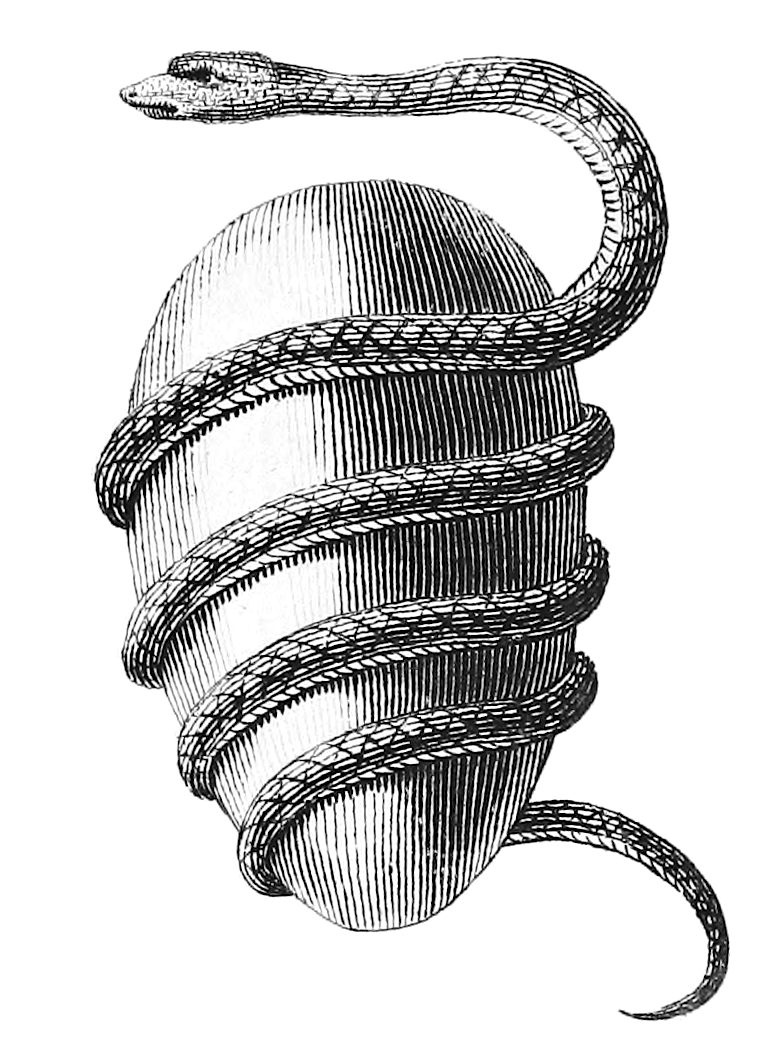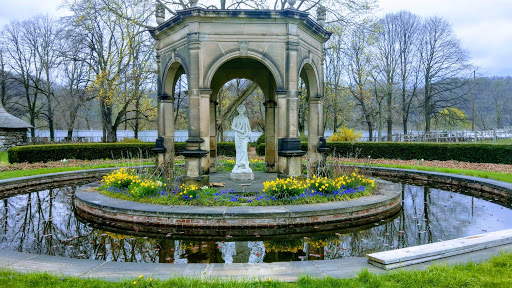|
Ophion
In some versions of Greek mythology, Ophion (; grc-gre, Ὀφίων "serpent"; ''gen''.: Ὀφίωνος), also called Ophioneus () ruled the world with Eurynome before the two of them were cast down by Cronus and Rhea. Mythology Pherecydes of Syros's ''Heptamychia'' is the first attested mention of Ophion. The story was apparently popular in Orphic poetry, of which only fragments survive. Apollonius of Rhodes in his ''Argonautica'' (1.495f) summarizes a song of Orpheus: :He sang how the earth, the heaven and the sea, once mingled together in one form, after deadly strife were separated each from the other; and how the stars and the moon and the paths of the sun ever keep their fixed place in the sky; and how the mountains rose, and how the resounding rivers with their nymphs came into being and all creeping things. And he sang how first of all Ophion and Eurynome, daughter of Oceanus, held the sway of snowy Olympus, and how through strength of arm one yielded his prerogative ... [...More Info...] [...Related Items...] OR: [Wikipedia] [Google] [Baidu] |
Pherecydes Of Syros
Pherecydes of Syros (; grc-gre, Φερεκύδης ὁ Σύριος; fl. 6th century BCE) was an Ancient Greek mythographer and proto-philosopher from the island of Syros. Little is known about his life and death. Some ancient testimonies counted Pherecydes among the Seven Sages of Greece, although he is generally believed to have lived in the generation after them. Others claim he was either a student of Pittacus, the teacher of Pythagoras, or a well-traveled autodidact who had studied secret Phoenician books. Pherecydes wrote a book on cosmogony, known as the "Pentemychos" or "Heptamychos". He was considered the first writer to communicate philosophical ideas in prose as opposed to verse. However, other than a few short fragments preserved in quotations from other ancient philosophers and a long fragment discovered on an Egyptian papyrus, his work is lost. However, it survived into the Hellenistic period and a significant amount of its content can be conjectured indirectly ... [...More Info...] [...Related Items...] OR: [Wikipedia] [Google] [Baidu] |
Rhea (mythology)
Rhea or Rheia (; Ancient Greek: Ῥέα or Ῥεία ) is a mother goddess in ancient Greek religion and Greek mythology, the Titaness daughter of the earth goddess Gaia and the sky god Uranus, himself a son of Gaia. She is the older sister of Cronus, who was also her consort, and the mother of the five eldest Olympian gods Hestia, Demeter, Hera, Poseidon and Zeus, and the king of the Underworld, Hades. When Cronus learnt that he was destined to be overthrown by one of his children like his father was before him, he swallowed all the children Rhea bore as soon as they were born. When Rhea had her sixth and final child, Zeus, she spirited him away and hid him in Crete, giving Cronus a rock to swallow instead, thus saving her youngest son who would go on to challenge his father's rule and rescue the rest of his siblings. Following Zeus' defeat of Cronus and the rise of the Olympian gods into power, Rhea withdraws her role as the queen of the gods to become a supporting figure ... [...More Info...] [...Related Items...] OR: [Wikipedia] [Google] [Baidu] |
The Greek Myths
''The Greek Myths'' (1955) is a mythography, a compendium of Greek mythology, with comments and analyses, by the poet and writer Robert Graves. Many editions of the book separate it into two volumes. Abridged editions of the work contain only the myths and leave out Graves's commentary. Each myth is presented in the voice of a narrator writing under the Antonines, such as Plutarch or Pausanias, with citations of the classical sources. The literary quality of his retellings is generally praised. Following each retelling, Graves presents his interpretation of its origin and significance, influenced by his belief in a prehistoric Matriarchal religion, as discussed in his book ''The White Goddess'' and elsewhere. Graves's theories and etymologies are rejected by most classical scholars. Graves argued in response that classical scholars lack "the poetic capacity to forensically examine mythology". Contents Graves interpreted Bronze Age Greece as changing from a matriarchal society ... [...More Info...] [...Related Items...] OR: [Wikipedia] [Google] [Baidu] |
Pelasgian
The name Pelasgians ( grc, Πελασγοί, ''Pelasgoí'', singular: Πελασγός, ''Pelasgós'') was used by classical Greek writers to refer either to the predecessors of the Greeks, or to all the inhabitants of Greece before the emergence or arrival of the Greeks. In general, "Pelasgian" has come to mean more broadly all the indigenous inhabitants of the Aegean Sea region and their cultures, "a hold-all term for any ancient, primitive and presumably indigenous people in the Greek world". During the classical period, enclaves under that name survived in several locations of mainland Greece, Crete, and other regions of the Aegean. Populations identified as "Pelasgian" spoke a language or languages that at the time Greeks identified as "barbarian", though some ancient writers nonetheless described the Pelasgians as Greeks. A tradition also survived that large parts of Greece had once been Pelasgian before being Hellenized. These parts fell largely, though far from exclusi ... [...More Info...] [...Related Items...] OR: [Wikipedia] [Google] [Baidu] |
Greek Mythology
A major branch of classical mythology, Greek mythology is the body of myths originally told by the Ancient Greece, ancient Greeks, and a genre of Ancient Greek folklore. These stories concern the Cosmogony, origin and Cosmology#Metaphysical cosmology, nature of the world, the lives and activities of List of Greek mythological figures, deities, Greek hero cult, heroes, and List of Greek mythological creatures, mythological creatures, and the origins and significance of the ancient Greeks' own cult (religious practice), cult and ritual practices. Modern scholars study the myths to shed light on the religious and political institutions of ancient Greece, and to better understand the nature of myth-making itself. The Greek myths were initially propagated in an oral tradition, oral-poetic tradition most likely by Minoan civilization, Minoan and Mycenaean Greece, Mycenaean singers starting in the 18th century BC; eventually the myths of the heroes of the Trojan War and its after ... [...More Info...] [...Related Items...] OR: [Wikipedia] [Google] [Baidu] |
Harmonia (Greek Goddess)
In Greek mythology, Harmonia (; grc, Ἁρμονία / harmoˈnia/, "harmony", "agreement") is the immortal goddess of harmony and concord. Her Roman counterpart is Concordia. Her Greek opposite is Eris, whose Roman counterpart is Discordia. Family According to one account, she is the daughter of Ares and Aphrodite.Scholia on Homer, ''Iliad'' B, 494, p. 80, 43 ed. Bekk. as cited in Hellanicus' ''Boeotica'' By another account, Harmonia was from Samothrace and was the daughter of Zeus and Electra, her brother Iasion being the founder of the mystic rites celebrated on the island. Almost always, Harmonia is the wife of Cadmus. With Cadmus, she was the mother of Ino, Polydorus, Autonoë, Agave, and Semele. Their youngest son was Illyrius. Mythology Those who described Harmonia as a Samothracian related that Cadmus, on his voyage to Samothrace, after being initiated in the mysteries, perceived Harmonia and carried her off with the assistance of Athena. When Cadmus was ... [...More Info...] [...Related Items...] OR: [Wikipedia] [Google] [Baidu] |
Yaldabaoth
Yaldabaoth, Jaldabaoth, or Ildabaoth is an evil deity and creator of the material world in various Gnostic sects and movements, sometimes represented as a theriomorphic, lion-headed serpent. He is identified as the Demiurge and false god who keeps the souls trapped in physical bodies, imprisoned in the material universe. The name is derived from the Aramaic expression ''yaldā bahôt'' (), which means "descendant of Chaos". Role in Gnosticism Gnosticism originated in the late 1st century CE in non-rabbinical Jewish and early Christian sects. In the formation of Christianity, various sectarian groups, labeled "gnostics" by their opponents, emphasised spiritual knowledge (''gnosis'') of the divine spark within, over faith (''pistis'') in the teachings and traditions of the various communities of Christians. Gnosticism presents a distinction between the highest, unknowable God, and the Demiurge, "creator" of the material universe. The Gnostics considered the most essential ... [...More Info...] [...Related Items...] OR: [Wikipedia] [Google] [Baidu] |
Demiurge
In the Platonic, Neopythagorean, Middle Platonic, and Neoplatonic schools of philosophy, the demiurge () is an artisan-like figure responsible for fashioning and maintaining the physical universe. The Gnostics adopted the term ''demiurge''. Although a fashioner, the demiurge is not necessarily the same as the Creator figure in the monotheistic sense, because the demiurge itself and the material from which the demiurge fashions the universe are both considered consequences of something else. Depending on the system, they may be considered either uncreated and eternal or the product of some other entity. The word ''demiurge'' is an English word derived from ''demiurgus'', a Latinised form of the Greek or . It was originally a common noun meaning "craftsman" or "artisan", but gradually came to mean "producer", and eventually "creator". The philosophical usage and the proper noun derive from Plato's ''Timaeus'', written 360 BC, where the demiurge is presented as the crea ... [...More Info...] [...Related Items...] OR: [Wikipedia] [Google] [Baidu] |
Gnosticism
Gnosticism (from grc, γνωστικός, gnōstikós, , 'having knowledge') is a collection of religious ideas and systems which coalesced in the late 1st century AD among Jewish Jews ( he, יְהוּדִים, , ) or Jewish people are an ethnoreligious group and nation originating from the Israelites Israelite origins and kingdom: "The first act in the long drama of Jewish history is the age of the Israelites""The ... and early Christian sects. These various groups emphasized personal spiritual knowledge (''gnosis'') above the orthodox teachings, traditions, and authority of religious institutions. Gnostic cosmogony generally presents a distinction between a supreme, hidden God and a malevolent demiurge, lesser divinity (sometimes associated with the Yahweh of the Old Testament) who is responsible for creating the nature, material universe. Consequently, Gnostics considered material existence flawed or evil, and held the principal element of salvation to be direct ... [...More Info...] [...Related Items...] OR: [Wikipedia] [Google] [Baidu] |
Pelasgus
In Greek mythology, Pelasgus ( grc, Πελασγός, ''Pelasgós'' means "ancient") was the eponymous ancestor of the Pelasgians, the mythical inhabitants of Greece who established the worship of the Dodonaean Zeus, Hephaestus, the Cabeiri, and other divinities. In the different parts of the country once occupied by Pelasgians, there existed different traditions as to the origin and connection of Pelasgus. The Ancient Greece, ancient Greeks even used to believe that he was the first man. Inachid Pelasgoí of Argos : In Argos, Peloponnese, Argos, several King of Argos, Inachid kings were called Pelasgus: * Pelasgus, brother to Apis (Greek mythology), Apis both sons of Phoroneus, is said to have founded the city of Argos in Peloponnesus, to have taught the people agriculture, and to have received Demeter, on her wanderings, at Argos, where his tomb was shown in later times. * Pelasgus, son of Triopas of Argos, Triopas and Sois (mythology), Sois, and a brother of Iasus, Agenor, son ... [...More Info...] [...Related Items...] OR: [Wikipedia] [Google] [Baidu] |
Robert Graves
Captain Robert von Ranke Graves (24 July 1895 – 7 December 1985) was a British poet, historical novelist and critic. His father was Alfred Perceval Graves, a celebrated Irish poet and figure in the Gaelic revival; they were both Celticists and students of Irish mythology. Graves produced more than 140 works in his lifetime. His poems, his translations and innovative analysis of the Greek myths, his memoir of his early life—including his role in World War I—''Good-Bye to All That'', and his speculative study of poetic inspiration ''The White Goddess'' have never been out of print. He is also a renowned short story writer, with stories such as "The Tenement" still being popular today. He earned his living from writing, particularly popular historical novels such as ''I, Claudius''; '' King Jesus''; ''The Golden Fleece''; and ''Count Belisarius''. He also was a prominent translator of Classical Latin and Ancient Greek texts; his versions of ''The Twelve Caesars'' and ... [...More Info...] [...Related Items...] OR: [Wikipedia] [Google] [Baidu] |







